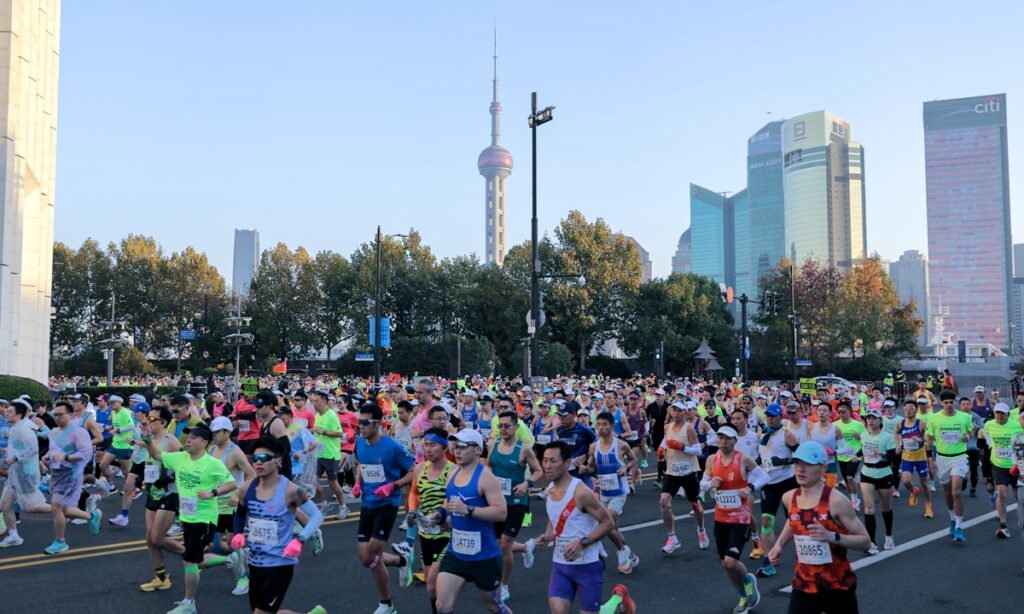China’s Marathon Super Weekend: A Fusion of Sports and Culture
A remarkable weekend for running enthusiasts, China is set to host its first “Marathon Super Weekend” on December 1, 2024, with a staggering total of 14 marathons taking place simultaneously across the nation. Nearly 260,000 participants are expected to hit the tracks, highlighting the growing popularity and enthusiasm for marathon events nationwide. The surge in registrations reflects not only the sport’s popularity but also the evolving role of marathons as a platform for cultural exchange and urban promotion.
According to the official website of China Marathon, this year’s event promises to be immensely exciting. Liu Min, the domestic champion of the Beijing Marathon, emphasized, “Marathons have evolved into an important platform for showcasing city culture, promoting national fitness, and driving social development.” This sentiment underscores the significance of marathons beyond mere athletic achievements; they are becoming key players in urban marketing and community engagement.
Each marathon event is increasingly integrating local cultural elements, making them unique to their respective cities. Runners will experience carefully curated race routes that not only showcase city landmarks but also include refreshment stations offering regional delicacies. By featuring race medals designed with traditional motifs, the events serve to promote local heritage and build a sense of identity among participants.
Spotlight on Wuhan and Wuxi Marathons
Among the prominent marathons scheduled are the Gold Label Road races—the Wuhan Marathon and the Wuxi Marathon. The Wuhan Marathon, recognized for its scalability, has set a new participation record with over 450,000 registrations. It features events ranging from full marathons to half-marathons and a 13-kilometer race, thereby catering to diverse running abilities. As reported by the People’s Daily, Wuhan will showcase its iconic landmarks, including the Hankow Customs House and the scenic Wuhan Yangtze River Bridge, allowing runners to immerse themselves in the city’s rich history and natural beauty while competing.
Similarly, the Wuxi Marathon boasts a unique “Sakura Course” designed to coincide with the blooming cherry blossoms of winter. Starting at Taihu Avenue, the marathon route extends through ecologically rich areas, including the Bogong Island Ecology Park and Changguangxi Wetland Park. Gu Wenlong from the Wuxi Municipal People’s Government described the event as an embodiment of the city’s charm, saying participants will feel the gentle touch of cherry blossom petals as they race, creating an unforgettable experience in an enchanting setting.
The Economic Impact of Marathons in China
Marathon events are not just athletic competitions; they have significant economic implications as well. A recent report by the People’s Daily highlighted that major marathons could stimulate local tourism and service sectors, yielding substantial economic benefits. For instance, the Wuxi Marathon in 2024 generated around 280 million yuan (approximately $38.7 million), marking a notable increase from the previous year. The largest contributors to this economic boost were dining and accommodations, accounting for 127 million yuan and 117 million yuan, respectively.
Zhang Wenzhi, a professional involved in marathon course management, emphasizes the multifaceted value that marathons bring to urban development. He remarked that this weekend’s events showcase not only a remarkable participation rate but also how cities can narrate their unique stories through sports. By blending the excitement of competitive running with the presentation of local culture, marathons in China are paving the way for a new era of community engagement and economic vitality.
The Future of Marathons in China
As marathons continue to evolve in China, it is essential for organizers to strike a balance between maintaining high standards in event management while fostering cultural representation. The design of aid stations should not only satisfy runners’ physical needs but also display local specialty foods that reflect the community’s essence. Furthermore, incorporating elements of local culture into medal designs and volunteer uniforms ensures that participants carry a piece of the city’s identity with them beyond the race.
Looking forward, there is a growing expectation for marathons in China to enhance professionalism and international appeal while remaining committed to promoting cultural content. With the success of events like the Wuhan and Wuxi marathons, it’s clear that the future holds vast potential for this exhilarating sport, making it a cornerstone of both fitness and cultural exchange in urban settings across China.
